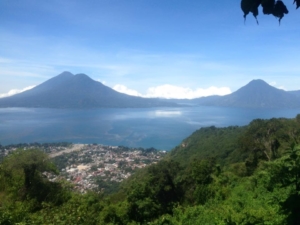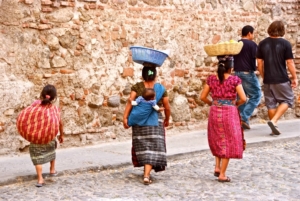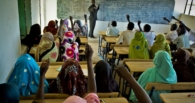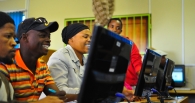A Transition from Guatemala to Oxford
From the Land of Eternal Spring to the City of Dreaming Spires
Liam Bluer
19 December 2018
/
- 0 Comments

Panajachel, Guatemala. Photo by Liam Bluer.
It’s 9am and I’m putting out the last of the chairs in the workshop, while my colleague Jorge fixes balloons to the wall either side of the sign that reads “FELICIDADES!” (congratulations). The guests are already starting to arrive, and I can tell which town each has travelled from today by the style of traje típico (traditional dress) she wears – the blues of San Antonio Palopó, the embroidered birds and flowers of Santiago Atitlán, the intricately patterned rows of Sololá. A mixture of Spanish, Kaqchikel, and Tz’utujil conversation drifts across the room as the guests take their seats. Some women have brought their families along; some have come alone, but all around the room the mood is jovial, celebratory. These women have recently completed the basic sewing course that I help run, and the significance of this occasion – their graduation ceremony – cannot be overstated. Most of them left school before they hit their teens (sadly common in Guatemala, where immediate economic needs often trump education), so to graduate from something – to receive a certificate and attend a celebration of their achievement – is, to put it mildly, a big deal. Not only that, but crucially, today each graduate will receive her own sewing machine, meaning she can immediately set about using her newfound skills to bolster her livelihood. But first there will be speeches, presentations, photos, and more cake than should be allowed first thing on a Tuesday morning.
I’m proud of these students, and honoured to be a part of this momentous day for them. I should be enjoying the moment; after all, this is precisely what I work for, but with a horde of other responsibilities vying for attention at the back of my mind, my thoughts start to wander… I have to meet with the microloans team at 10 to go over the new M&E surveys; after which I’ll be jumping in the back of a pickup and taking a prospective donor to visit some of the preschools we operate in the surrounding communities; I’m going to need to cycle over to the carpentry shop at some point to inspect Mario’s new furniture designs; Jorge and I will be visiting local schools later in the week to promote our computer classes and we’ve yet to prepare our pitch; I wonder if I’ll ever get round to my emails, or do something about that stack of invoices on my desk? Oh well, there’s always tomorrow; but wait… didn’t I agree to help translate for the visiting clinic then? Gaaaah…
This was a typical morning at Mayan Families, the NGO in the highlands of Guatemala where I worked for three years. As manager of the Social Entrepreneurship Programmes, I worked across the Microloans Department and the four trade schools (sewing, carpentry, welding, and computing) we operated, offering vocational training to those who lack a formal education. On top of all that I mucked in wherever necessary, which, in an organization comprising 20+ programmes and 10,000 beneficiaries, could mean pretty much anything. Keeping all the proverbial plates spinning was a challenge, but one my colleagues and I relished.
I was fortunate that my job required me to attend events such as the graduation described above; to experience those moments of hope, and see directly what a “development output” looks like from a human perspective. However, I only felt able to really appreciate the significance of such things because my work also exposed me to some dark realities, taking me to meet countless people whose stories put a human face on the problems that international development seeks to address. Anyone who has worked in the field will know how sobering such encounters can be; how they convey brutal truths in ways that no report or statistic can. Many of the people I worked with faced a level of adversity I can barely believe even after having seen it first hand, and even just writing about it now brings on that familiar sense of outrage at the structural conditions that force people into such circumstances. I could dwell here on the difficulties that people I met faced, and paint a picture of a country battered by war, genocide, food insecurity, inequality, but I feel that somehow wouldn’t do justice to those people. What really stays with me from Guatemala, and what I feel is most important to get across, is people’s ability to overcome adversity, to navigate the barriers that inequality and marginalisation place in their path, and – importantly – how development efforts can help.
I remember Micaela, who, with access to microfinance, was able to start an export business, sending her artisanal products to neighbouring Honduras, where she got a better price. I remember Mario, first in his family to graduate from high school thanks to a sponsorship, now a master carpenter after attending Mayan Families’ trade school and staying on afterwards as an apprentice. There was Elena, who defied traditional gender norms and trained to be a welder (and was top of the class week in, week out). And there were of course the many groups of vocational school graduates I had the privilege of celebrating with. The people I came to know in Guatemala taught me so much about human endeavour, and I’m struggling to articulate just how much that impacted the way I see the world.
If I’m honest, sitting here in the Mokoro office with my view of the Oxford skyline, it feels a little odd to no longer have that direct connection with the realities, problems, and people my work affects. I’ll admit that I’ve wondered at times: so far removed from local contexts, will I view issues or approach problems differently? Will my work yield tangible results? Will I get restless and yearn for adventure? But these are of course the wrong questions. All I really need to ask is this: am I in a position where my efforts and skills can be part of something that meaningfully and effectively improves the world? From what I’ve seen at Mokoro, the answer is a resounding yes.

Local women. Photo by Carlos Van Vegas, FlickR
When I sat down to write this piece I had in mind a sort of love letter to Guatemala. It hasn’t really come out that way; it’s hard to write about my passion for the place and its people without railing against the injustices I saw there, or reflecting on the profound impact my experiences had on me. I certainly didn’t want to make this piece about me, but Guatemala is so bound up with who I am now that I’ve found it impossible to keep myself out. Hopefully that just stands as testament to what a truly incredible place it is. All that being said, I’ll finish with a couple of convictions Guatemala left me with and which I know will serve me well in my Mokoro career and beyond: the first is a steadfast belief in people, and their drive and ability to improve their own lives and achieve their potential. I’ve come to think of development work as an expression of that belief. Which brings me onto the second conviction: the knowledge that I am in the right line of work. After what I saw in Guatemala, I am utterly convinced that development efforts can and do have a lasting and positive effect on individuals’ lives, and that is something I want to be part of.
You must be logged in to post a comment.



